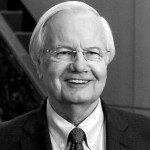
Protesters walk up Pennsylvania Avenue during the Women's March on Washington, with the US Capitol in the background, on Jan. 21, 2017 in Washington, DC. Large crowds attended the anti-Trump rally a day after in as the 45th president. (Photo by Mario Tama/Getty Images)
Last year I met a fellow named Charles Bayer whom I came to know well simply through the columns he writes for “The Senior Correspondent,” an electronic outlet out of North Carolina. I liked the marquee — “The Senior Correspondent” — probably because that’s what I am. I read several of his articles and recognized a kindred spirit and now I have a growing collection of his work on my desktop. This is his latest and I’m sharing it with you because it comes not from New York or Washington where pundits wait in green rooms to hold forth on any cable or network show that will have them, but because he lives in a quiet corner of Claremont, California, where we met for the first and only time, and in his retirement has nothing to gain from his musings but his own and the satisfaction of a few of us who have learned to trust him. He describes himself as a “somewhat retired theological professor and congregational pastor” who still loves to think before he writes. Like others of us, he has lived long enough to see the connections between then and now. And the message the past has for the present. — Bill Moyers
A Date That Will Live in Infamy
By Charles Bayer
A date that will live in infamy. That is how President Franklin Delano Roosevelt described the events of Dec. 7, 1941. Sept. 11, 2001 was second date which deserved that designation. Both of these dates resulted from America being attacked by hostile powers from beyond our shores. Jan. 20, 2017 may well qualify as the third infamous date. The attack in this event, came, however, not from some malignant foreign source, but from our own nation’s seat of power, the office of president of the United States.
This column was first drafted the evening of the Inauguration. While I did not and could not watch the sacred tradition in which this new president took the oath of office, I did later watch a recording of his speech. It left me speechless! The overarching theme was that America has been a desperately worthless, weak nation, devoid of any decency, and ruled by small ineffective people. But now a savior has arrived, and America is going to be great again, pulled out of the malaise that has over the recent years been created by our leaders who filled the swamp and poisoned it.
Of course, patriotism is a virtue rightly ingrained in our national psyches. But a national chauvinism that positions us against every other nation or entity and pledges that we will produce the military firepower able to get and keep their attention, and provide safety at home and peace in the world, is just silly.
I know it may not be considered in good taste to invoke what Adolf Hitler promised the German people, but this evening I have been listening to and watching a recording of his first speech as chancellor in 1933. Hitler began by decimating the reputations of the leaders before him who he regarded as having demoralized and debauched the nation. He then promised to make Germany great again — he actually used the exact German equivalent words! He said that this powerful rebirth of Germany’s world role must be brought about by the Volk — the German peasants and workers — the people. They must stand without equivocation, putting Germany first: first in their lives and first in the world. There must be trust in no other nation, and Germany must form no alliances in order to safeguard the Volk. And it will be done because it is the will of God!
It’s all there, friends. And if the United States goes any further down that road we will end up enemies of the rest of the world, with decreasing economic strength despite our increased military might. One might even remember the quasi-Nazi, Charles Lindbergh, who led a sizable handful of citizens in chanting, “America First!”
Thus we may produce the end of the world’s best experiment in democracy. I have recently come across an author who predicted 20 years ago what happened today. In 1997, the philosopher Richard Rorty in his book, Achieving our Country, described what would inevitably happen if the liberals who have controlled the nation forget to pay attention to the vast millions of rural residents and desperate unemployed workers:
“At this point, something will crack. The nonsuburban electorate will decide that the system has failed and start looking around for a strong man to vote for, and … once a strong man takes office, nobody can predict what will happen.”
If the 1933 events in Germany are in any way a prototype of what we can now expect, that should shake us body and soul.
What shall we do now? I doubt we can pass this off as simply an intellectual or academic problem that can be solved by further conferences, documents, symposia or formal papers.
Perhaps we should rather look at what has produced serious positive change in the recent past. I think of a woman who just sat in the front seats of a bus, and the Freedom Riders who traveled throughout the American South at the risk of their lives. And I remember the tens of thousands of both young and older people who hit the streets and finally whose acts were critical in ending the disastrous Vietnam War. To the extent that these actions were nonviolent, they gained the respect of the American people. Violence just sets things back. New generations of in-the-street activists, not journalists or academics, might blunt the destructive nationalistic thrust of the new administration, and prepare the rest of us to play an important role in making America good again.





